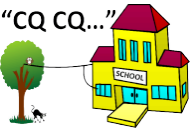Coordinated Universal Time (UTC)
Ever wondered why international news rooms have more than one clock on the wall? Each clock displays the time in a different capital city. Of course you know if it is midday here it is actually midnight on the opposite side of the world, right? So what would happen if I was talking over the air to a friend of mine in a distant country and I said I'd call him back tomorrow at lunch time? Well, unfortunately, as Douglas Adams put it in his book "A hitchhiker's guide to the galaxy", "Time is an illusion. Lunch time doubly so." This activity will make sure you never miss a "sked" with your radio buddies.
Introduction
Amateur radio communication is not restricted by international boarders nor to local time zones. In order to arrange international communication schedules, Amateur radio operators use a universal measurement of time called Coordinated Universal Time (UTC). As well, times are always reported in a 24-hour not 12-hour format, so there is no "am" or "pm". Instead, operators add the letter "Z" or the word "Zulu" after the time just to indicate it is UTC. The conversion from local time to UTC is usually a "simple" matter of adding or subtracting a whole number of hours called the local UTC offset. It is interesting to note that the current time in UTC may actually refer to the day before. For example, on the Australian East coast during daylight savings, UTC is exactly 11 hours behind our local time. So, let's say, it is 9am in the morning here, that's 0900 (zero nine hundred hours) in 24 hour format. Subtract 11 hours to get UTC: That's 2200Z (twenty-two hundred hours Zulu) or 10pm actually the day before in UTC. It may sound complicated, but Amateur radio operators always have a UTC clock on the wall of their shack. Of course, most smart phones can display multiple time zones including UTC.
Preparation
- Get a clock that lets you adjust the big and little hands (ask the first-grade teacher)
- Get a smart phone that can display UTC and Local times
Activity
- Take it in turns to set the clock and ask the question "what is X:XX am/pm in 24-hour format".
- Take it in turns to ask the question "what is XXXX hours in 12-hour format". The responder sets the clock appropriately.
- Look up the current time in UTC and take it in turns to read it out.
Homework
- When one of your friends or a family member asks you what the time is, say: "Its XXXX hours zulu".

